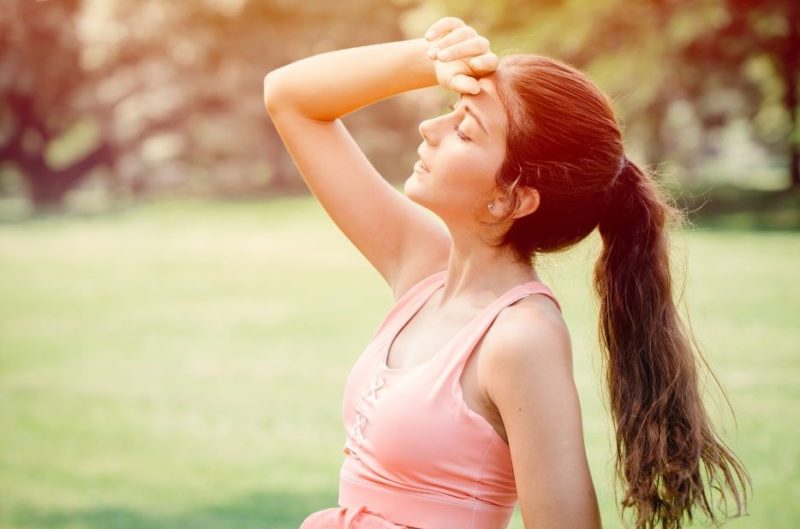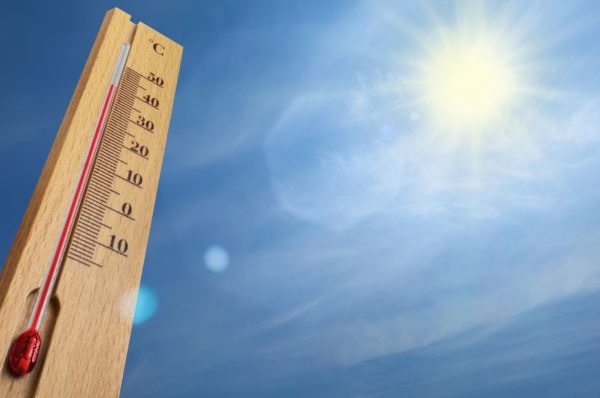
What happens when it gets too hot in the gym? Dr. Elly Hart explains what to look out for in your gymnasts.
With temperatures on the rise this summer, gymnasts, parents, and coaches should be aware of the different types of heat related illness including but not limited to: heat cramps, heat syncope, heat exhaustion, and heat stroke.
Heat Cramps:
What is it: a painful tightening (or contraction) of a large muscle group (ex: thigh/quadriceps muscle of calf muscle) because of dehydration (not enough water intake) and a decrease of sodium and chloride (which you normally get from your diet or sports drinks like Gatorade©).
What are the signs/symptoms: a “Charlie horse” or rapid and unexpected cramp or contraction of your muscle.
What are some general treatment guidelines: stretching, rapid cooling with an ice pack or cold towel, and electrolyte and fluid replacement are the main treatments. Always tell an adult if something hurts or bothers you and with an adult’s help they can determine if further medical treatment is necessary.
How can you prevent this: Drink plenty of water at practice and consider adding in a sports drink or another drink which contains electrolytes.
Heat Syncope:
What is it: “fainting” or a transient loss of consciousness caused by a lack of blood flow to the brain from an increased temperature.
What are the signs/symptoms: Fainting or falling to the ground unexpectedly.
What are some general treatment guidelines: If you witness this happen to a gymnast/teammate get (or send for) an adult immediately. If this happens to you, prior to sitting up, call for an adult to help you, and they can access the situation and determine if further medical help is needed. The main treatment after this occurs is to give the gymnast fluids and lay him/her on their back with his/her feet elevated above their heart.
How can you prevent this: Drink plenty of water at practice and consider adding in a sports drink or another drink which contains electrolytes. If you are feeling faint or not like yourself, stop the skill/event/practice, tell an adult, and if safe lay down with your legs elevated above your heart.

Heat Exhaustion
What is it: This is when your core body temperature rises above normal but stays below 102.2 degrees F (39 degrees C) and there are no changes to your mental status (you have normal movement, talking, and function). This is the MOST COMMON heat illness.
What are the signs/symptoms: Gymnasts will have a significant amount of sweating, feel nauseous, and may even vomit.
What are some general treatment guidelines: If this is suspected, make sure you have a way to check the gymnast’s temperature. Treatment usually consists of table salts, drinking water/electrolyte drinks or IV hydration, and cooling with ice packs, ice water submersion, or cooling tools.
How can you prevent this: The main cause of heat exhaustion is from dehydration. Drink plenty of water at practice and consider adding in a sports drink or another drink which contains electrolytes. If you are feeling “off” or not like yourself, stop the skill/event/practice, and tell an adult, as this could be early signs of heat exhaustion.
Heat Stroke:
What is it: this is a MEDICAL EMERGENCEY and when the core body temperature rises above 102.2 degrees F (39 degrees C) and there is a change to your mental status (you have trouble with movement, talking, and functioning).
What are the signs/symptoms: extremely fast heartbeat (tachycardia), abnormal breathing (tachypnea), changes to your mental status (you have trouble with movement, talking, and functioning), you will NOT be sweating and instead have hot dry skin, and your core body temperature rises above 102.2 degrees F (39 degrees C).
What are some general treatment guidelines: activate your gym’s emergency action plan (which includes calling 911), help rapidly reduce the body’s temperature by ice water submersion, cooling blankets, fanning, and IV hydration.
How can you prevent this: The main cause of heat stroke is from hot temperature environments combined with dehydration. Drink plenty of water at practice and consider adding in a sports drink or another drink which contains electrolytes. If you are feeling “off” or not like yourself, stop the skill/event/practice, and tell an adult, as this could be early signs of heat stroke.
The best treatment for heat related injury and illness is prevention! Always make sure you have water and/or a sports drink for your practice and be sure to take sips between events. You should start your practice with a full water bottle but end the day with an empty one! Also, don’t be afraid to speak up if you are feeling off or not right; let an adult know, don’t be a hero and try to push through.
Dr. Elly Hart, DScPAS, PA-C, MPAS, ATC, LAT is a Physician Assistant at Boston Children’s Hospital and founder of Gymnastics Medicine: Education and Research.